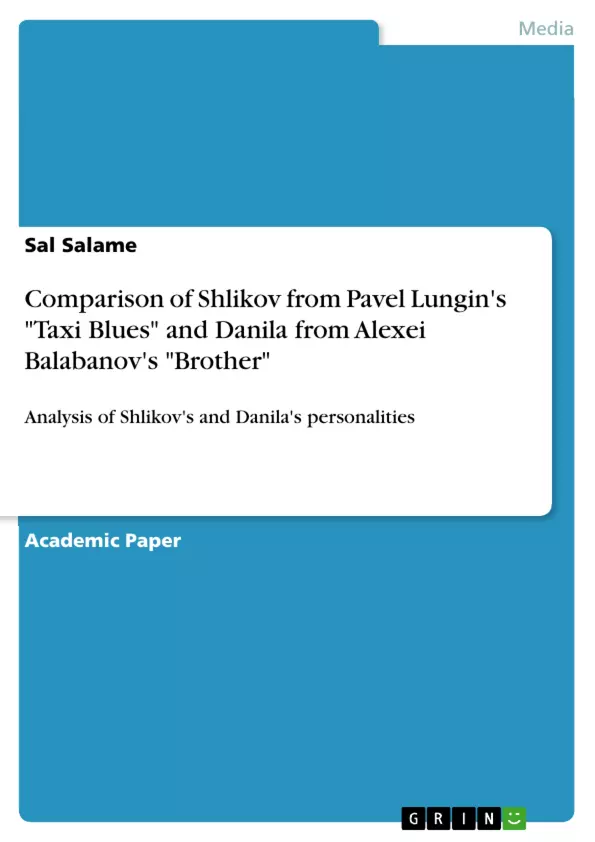The chaos and plight of Russian citizens was reflected in cinema throughout these years and was even encouraged due to Gorbachev’s political relaxation and lack of censorship. Pavel Lungin’s "Taxi Blues" (1990) and Alexei Balabanov’s "Brother" (1997) are great examples of such films that expose the reality of life in Russia. "Taxi Blues" and "Brother" both present the harsh side of life such as criminal networks, violence, psychological torment and stress. However, both films differ in how the main character deals with these problems and each character’s personality is the main factor that leads to their different outcome. "Taxi Blues" presents a Shlikov, a neurotic character with a Type A personality who ineffectively deals with his life’s plight and struggles while "Brother" presents Danila, a more relaxed man with a Type B personality that provides him with more efficient problem solving skills and resilience.
Inhaltsverzeichnis (Table of Contents)
- How Personality can Influence One's Dealing with Life Problems and Events
- Taxi Blues: A Depiction of a Neurotic Type A Personality
- Brother: A Portrayal of a Relaxed Type B Personality
- Conclusion
Zielsetzung und Themenschwerpunkte (Objectives and Key Themes)
This paper examines how personality can influence an individual's ability to cope with life problems and events, using the Russian films Taxi Blues and Brother as case studies. The analysis focuses on contrasting the personalities of the main characters, Shlikov and Danila, and their differing responses to the challenges they face in the post-Soviet era.
- The impact of personality on coping mechanisms
- The portrayal of the post-Soviet reality in Russian cinema
- Type A and Type B personality traits
- The role of neurosis in shaping individual responses to stress
- The influence of cultural context on personality and behaviour
Zusammenfassung der Kapitel (Chapter Summaries)
- This chapter examines how personality can influence an individual's ability to cope with life problems and events. It introduces the films Taxi Blues and Brother, which will be used as case studies to illustrate the impact of different personality types on individual responses to challenges.
- This chapter focuses on the film Taxi Blues and its main character, Shlikov. It analyzes Shlikov's personality as a neurotic Type A personality and explores how his traits, such as his aggression, ambition, and need for control, contribute to his ineffective coping strategies.
- This chapter examines the film Brother and its main character, Danila. It explores Danila's personality as a relaxed Type B personality and contrasts his effective coping mechanisms with Shlikov's struggles. The chapter highlights Danila's resilience, flexibility, and ability to navigate the challenges of the post-Soviet world with greater success.
Schlüsselwörter (Keywords)
This work explores the relationship between personality, coping mechanisms, and life events in the context of the post-Soviet era. Key themes include Type A and Type B personality traits, neurosis, emotional manipulation, resilience, and the portrayal of the post-Soviet reality in Russian cinema.
Frequently Asked Questions
How do the films "Taxi Blues" and "Brother" depict Russian life?
Both films expose the harsh realities of post-Soviet Russia, including criminal networks, violence, and economic instability.
What is Shlikov's personality type in "Taxi Blues"?
Shlikov is described as a neurotic Type A personality—aggressive, ambitious, and struggling with a need for control.
How does Danila from "Brother" differ from Shlikov?
Danila possesses a more relaxed Type B personality, which gives him greater resilience and more efficient problem-solving skills in chaotic environments.
What role did Gorbachev's reforms play in cinema?
Political relaxation and the lack of censorship allowed filmmakers to realistically portray the plight of Russian citizens.
Does personality influence coping with social crisis?
Yes, the analysis shows that Shlikov’s rigidity leads to torment, while Danila’s flexibility allows him to navigate the criminal underworld more effectively.
- Quote paper
- Sal Salame (Author), 2020, Comparison of Shlikov from Pavel Lungin's "Taxi Blues" and Danila from Alexei Balabanov's "Brother", Munich, GRIN Verlag, https://www.grin.com/document/901021



